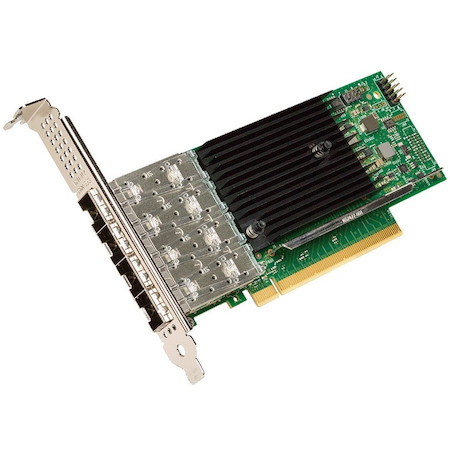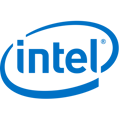Intel® Ethernet 800 Series network adapters improve application efficiency and network performance with innovative and versatile capabilities. With its high 10/25GbE port density, the E810-XXVDA4 adapter is designed to optimize high-performance system workloads for Cloud and Communications.
Performance optimizations and port density for Cloud and Storage deployments
- Four 25GbE SFP28 ports deliver multiple high- speed connections
- Application Device Queues (ADQ) provides dedicated traffic queues to reduce latency and increase application throughput
- Dynamic Device Personalization enables protocol-specific traffic acceleration to improve packet processing efficiency and reduce CPU overhead
- iWARP and RoCEv2 support provides high-speed, low-latency, high-throughput connectivity for Cloud storage targets
Accelerated packet processing and PCIe slot savings for Communications workloads
- Four 25GbE SFP28 ports deliver greater bandwidth in slot-constrained RAN systems
- Enhanced Data Plane Development Kit (DPDK)support increases packet processing speeds
- Dynamic Device Personalization enables protocol- specific traffic acceleration and reduces CPU overhead for emerging high-bandwidth workloads
- IEEE 1588 PTP v2 Precision Time Protocol support enables precise clock synchronization across 5G
Flexible Configurations
Intel® Ethernet Optics, and specification-compliant Active Optical Cables and Direct Attach Cables, can support multiple configurations.
All 800 Series products include these technologies
Greater Predictability at Scale
As modern data centers scale, a key challenge is to provide scalable, predictable application-level performance. Application Device Queues (ADQ) technology improves performance scalability and predictability by dedicating queues to key workloads, delivering predictable high performance through dramatically reduced jitter.
Increasing the predictability of application response times by lowering jitter enables more compute servers to be assigned to a task and can allow more users to access the system, providing a better end-user experience. Even applications that are not large scale can benefit from higher consistency, enabling them to meet service-level agreements (SLAs) more easily.
ADQ enables application-specific data steering, signaling, and rate limiting using an optimized application thread to device data path. This ability to dedicate queues and shape network traffic not only increases performance, it reduces latency and improves throughput.
Increase Throughput and Lower Latency
Remote Direct Memory Access (RDMA) provides high throughput and low-latency performance for modern high-speed Ethernet by eliminating three major sources of networking overhead: TCP/ IP stack process, memory copies, and application context switches. Intel Ethernet 800 Series Network Adapters support all Ethernet-based storage transport, including iWARP, RoCEv2, and NVMe over Fabric.
RoCE (RDMA over Converged Ethernet): RoCEv2 substitutes the InfiniBand physical layer and data link layer with Ethernet, operates on top of UDP/IP, and is routable over IP networks.
- General Information
- Manufacturer
- Intel Corporation
- Manufacturer Website Address
- http://www.intel.com
- Brand Name
- Intel
- Product Series
- 800
- Product Type
- 25Gigabit Ethernet Card
- Technical Information
- Chipset Manufacturer
- Intel
- Chipset Model
- E810-CAM1
- Interfaces/Ports
- Host Interface
- PCI Express 4.0 x16
- Total Number of Ports
- 4
- I/O Expansions
- Expansion Slot Type
- SFP28
- Media & Performance
- Media Type Supported
- Optical Fiber
- Maximum Data Transfer Rate
- 200 Gbit/s
- Network & Communication
- Network Technology
- 25GBase-CR
- 25GBase-SR
- 25GBase-LR
- Physical Characteristics
- Form Factor
- Plug-in Card
- Bracket Height
- Full-height/Low-profile
- Miscellaneous
- Application/Usage
- Network
- Device Supported
- Server
- Environmentally Friendly
- Yes
- Environmental Compliance
- Restriction of Hazardous Substances (RoHS)


